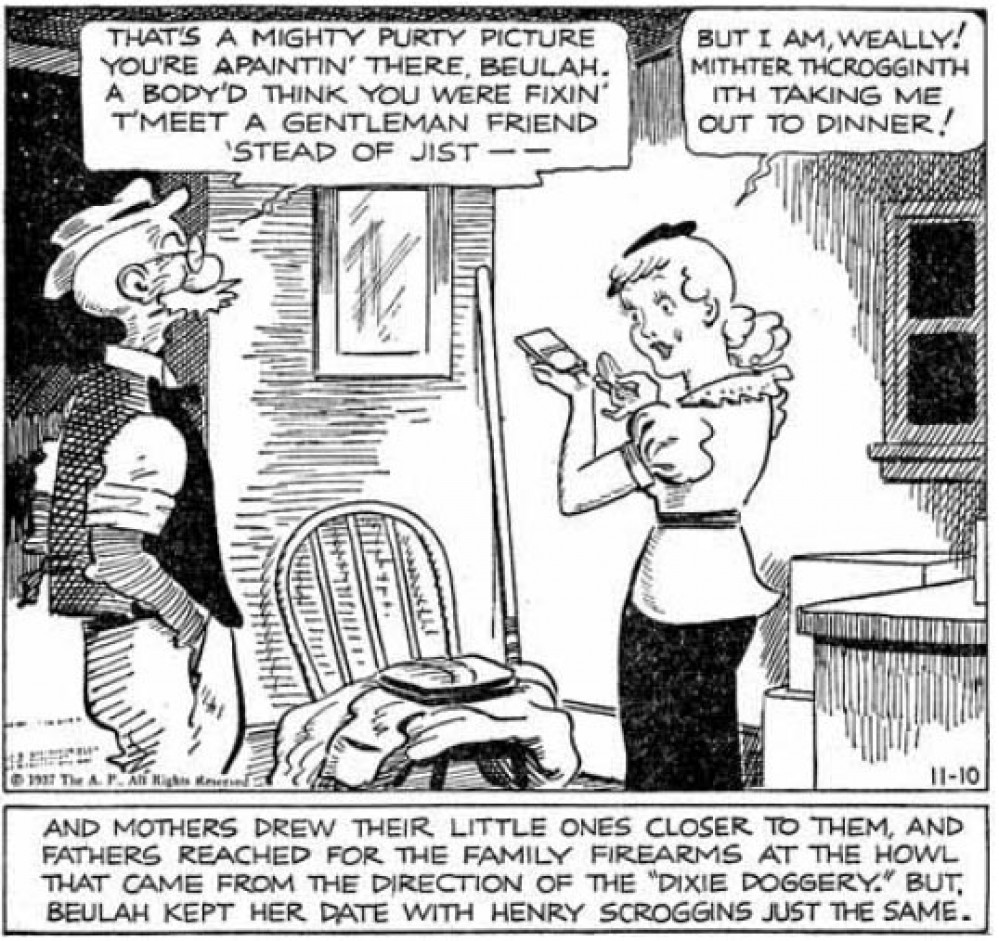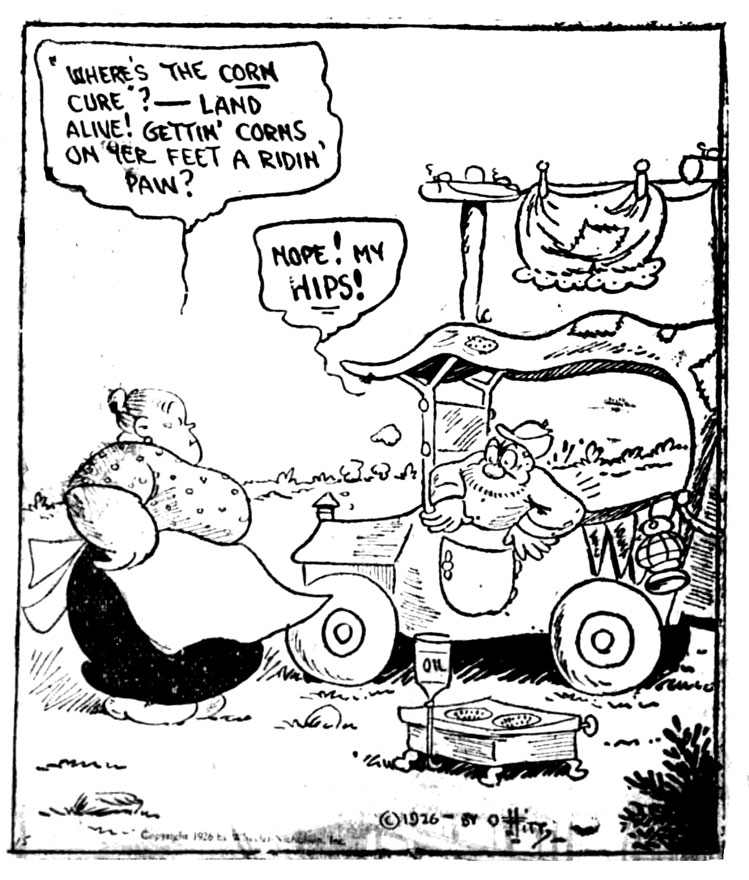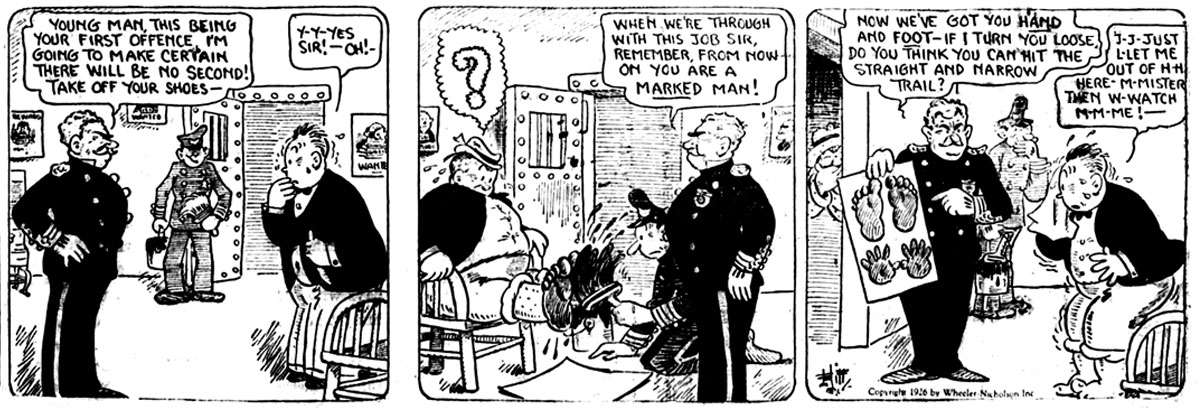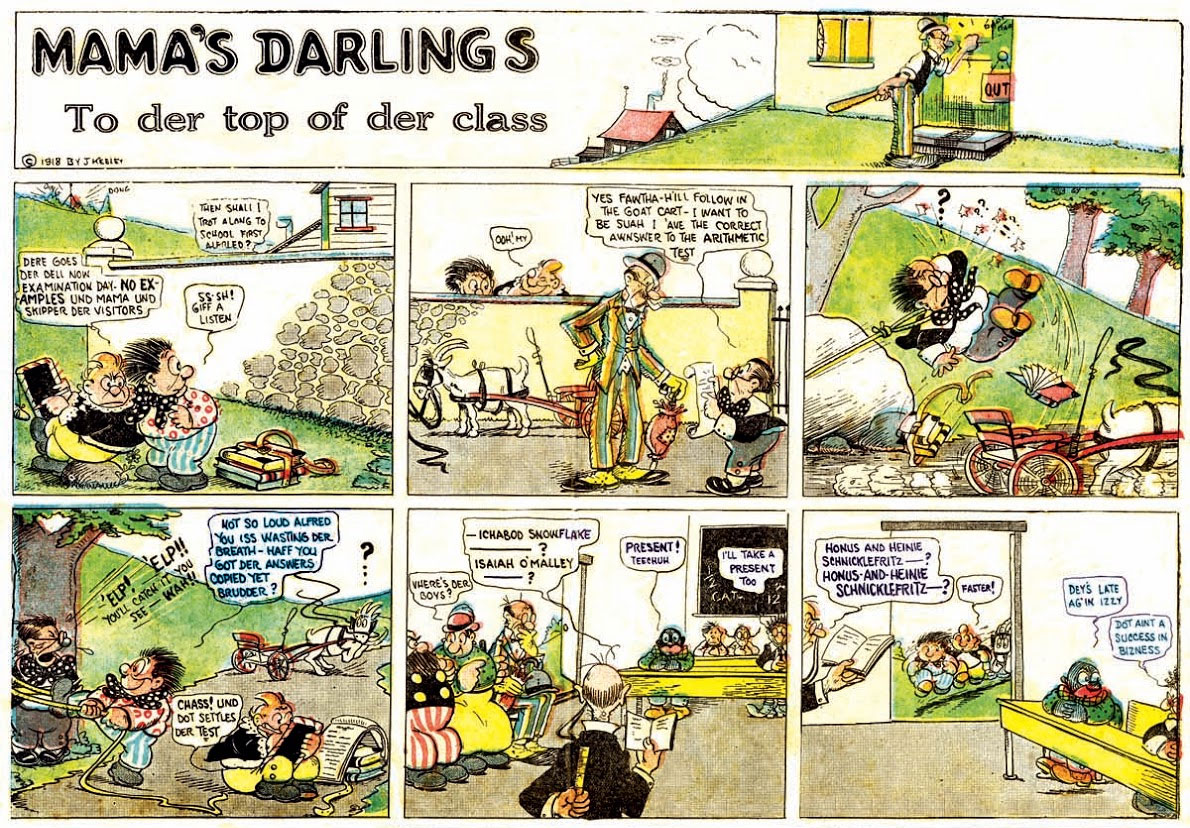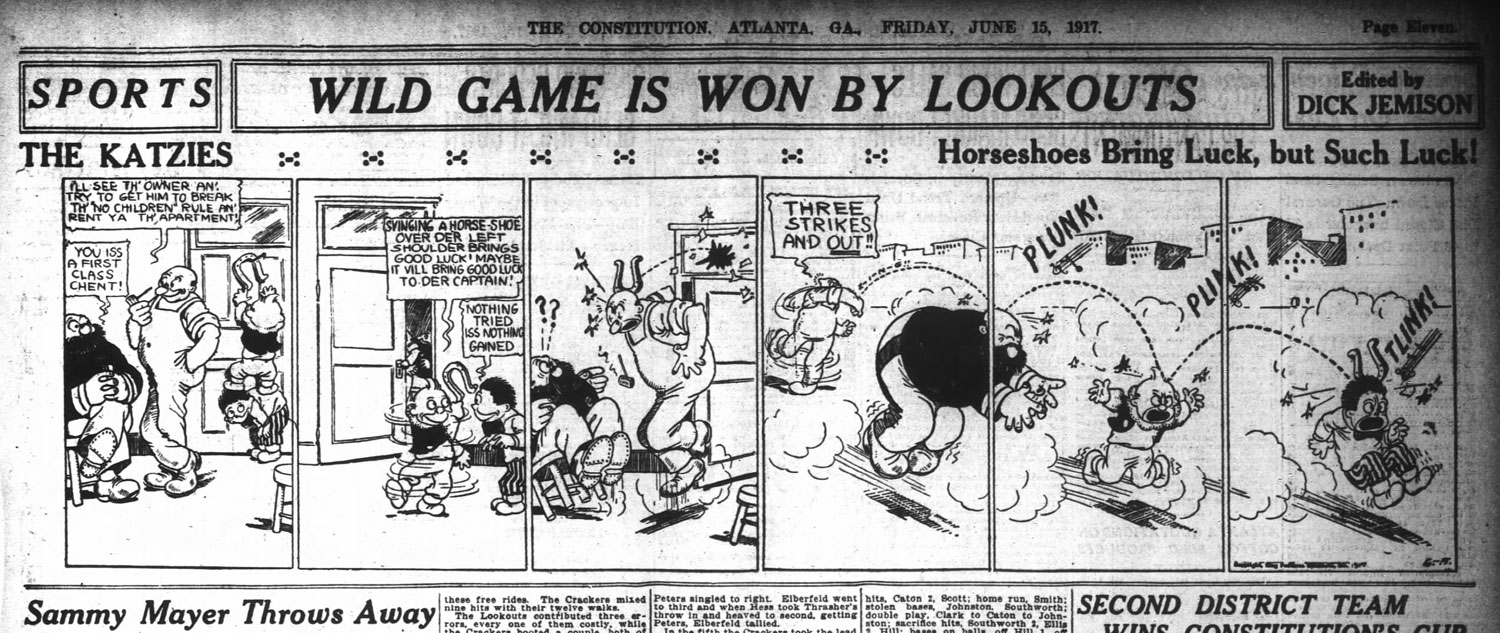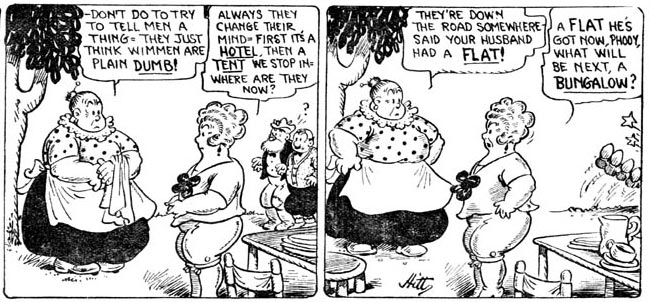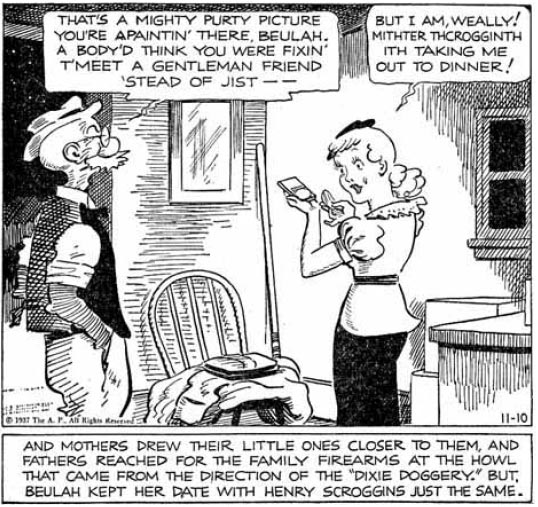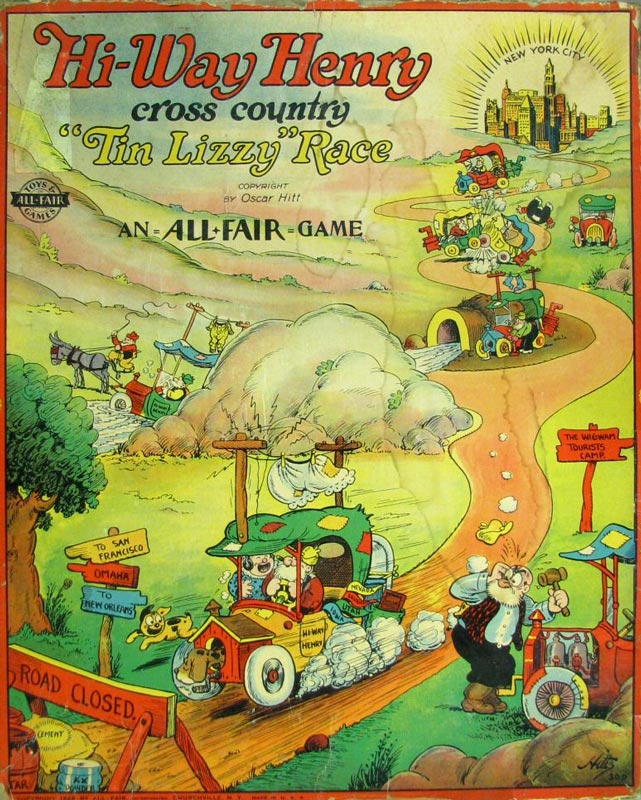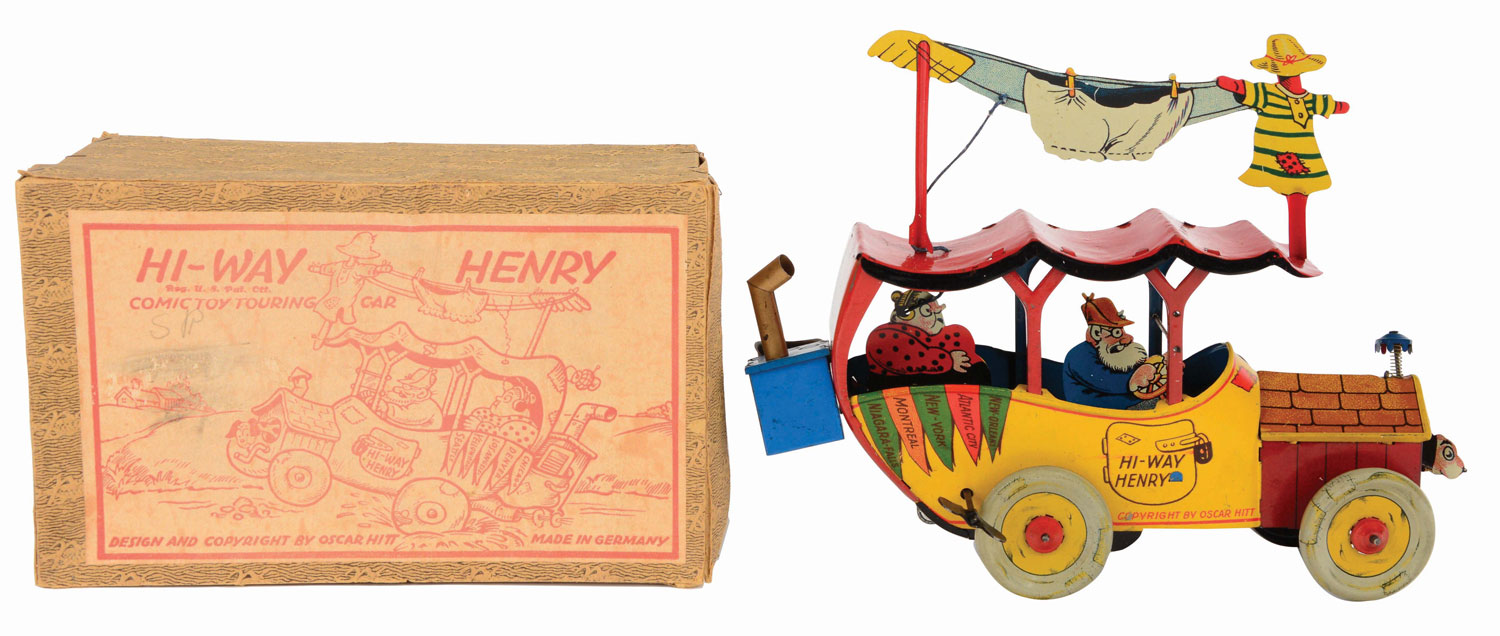Oscar Hitt was an early-20th century German-American cartoonist, as well as a designer of board games and toys. His longest-running cartoon feature was the 'Neighborly Neighbors' panel (1930-1938). Another creation, 'Hi-Way Henry' (1926), appeared in both cartoon panels and toys. Remarkably enough, Hitt not only drew his own rip-off of Rudolph Dirks' 'The Katzenjammer Kids' ('Mama's Darlings', 1917-1918), he also assisted Dirks' successor Harold Knerr on the original 'Katzenjammer Kids' (1917-1918), and later worked with Dirks himself on the continuation of his signature series under a different title, 'The Captain and the Kids' (1920s).
Life
Oscar Samuel Hitt was born in 1892 in the Sneinton suburb of Nottingham, England, but was of German descent. In England, the family lived with Hitt's maternal grandfather, Oliver Altree. On 26 September 1901, Oscar and his mother Edith traveled by boat to the United States, eventually settling in Salt Lake City, Utah. His stepfather, William Powe, worked there as a hatter. In 1917, when the United States entered World War I, Hitt was drafted. By 1922, he lived in New York City, and a decade later, he became a naturalized American citizen living in Manhattan. By the mid-1930s, Hitt lived in Miami Beach, Florida. It is unknown when he passed away.
Early cartooning career
Around the time of his World War I draft, Oscar Hitt was listed as an artist with the Chicago Herald. Between 30 October 1916 to 12 May 1917, his first comic strip 'Hitt and Runn' was syndicated by the World Color Printing company to newspapers like the Winnipeg Evening Tribune.
The Katzenjammer Kids and other pranksters
Shortly afterwards, Hitt was working for King Features Syndicate on the popular gag comic 'The Katzenjammer Kids'. This groundbreaking Sunday comic feature starring two German-American prankster kids was originally created by Rudolph Dirks, but since 1913 continued by Harold Knerr. Between 28 May 1917 and 1919, Hitt drew the short-lived daily comic spin-off, 'The Katzies', assisted by ghost artist John Campbell Cory. A possible explanation for the strip's short durability may have been that the daily spin-off left little room for much graphic detail. The comedy was therefore more verbal, even though a large part of the Sunday comics' appeal were its slapstick and pranks.
'The Katzies' (The Atlanta Constitution, 15 June 1917).
Oddly enough, around the same time he was working on 'The Katzies', Hitt also drew a gag comic called 'Mama's Darlings', which clearly copied the basic set-up of 'The Katzenjammer Kids', but ran in The Chicago Herald from 24 June 1917 until 28 August 1918. 'Mama's Darlings' was abruptly discontinued when 'Katzenjammer Kids' publisher William Randolph Hearst bought the paper. On top of it all, during the early 1920s, Hitt also worked for the original 'Katzenjammer Kids' creator Rudolph Dirks as ghost artist on 'The Captain and the Kids', which ran in The New York World and other newspapers owned by Hearst competitor Joseph Pulitzer. This carbon copy, but under another title, had been created by Dirks in 1914 after regaining the rights to his characters after a court case with his original taskmaster, William Randolph Hearst.
As such, Oscar Hitt worked not only on the actual 'Katzenjammer Kids' comic, but also on his own rip-off creation 'Mama's Darlings' and Rudolph Dirks' simultaneous continuation 'The Captain and the Kids'.
1920s cartoon features
During the 1920s, Oscar Hitt worked on several short-lived comic features for different syndicates. For the McClure Syndicate, he created the Sunday comic 'Seezem and Squeezem' (1924-1926). In 1925, his daily strip 'Ever Since Adam' was distributed by NEA/ACE Features. Between 19 July and 28 August 1926, he had four daily features syndicated through Wheeler-Nicholson Inc.: the teenage humor strip 'Ambitious Ambrose', the automotive-themed panel 'Hi-Way Henry', the funny animal strip 'Wally and his Pals' and the country sage panel 'Uncle Eph Says', the latter credited to "Duncan" and signed with "Hickey". Between 1926 and 1928, the Graphic Syndicate ran his daily strip 'Mack and Marx', credited to "Sam Hitt".
'Neighborly Neighbors' (1938).
Neighborly Neighbors
Hitt's longest-running cartoon feature was the daily panel/comic strip 'Neighborly Neighbors', which ran in newspapers like the Sarasota Herald, the Elensburg Daily Record and the Ludington Daily News through the Associated Press. During its first run, the panel appeared under varying titles, for instance 'Big Moments in Little Lives', 'Dude Ranchers', 'Heroes For A Day', 'Mister Tite Of Titusville', 'Old Man Morton's Son Elmer', 'The Odd Jobs Man', 'When All The World Seems Sad' and 'When The Going's At Its Worst', before in March 1931 settling on its definitive title 'Neighborly Neighbors'. Spread over three columns, this daily feature visualized everyday village life. In August 1938, Hitt passed the pencil to John Milt Morris, who continued the panel until 30 January 1955, and additionally produced a Sunday comic version (1941-1955).
'Hi-Way Henry Cross Country' game.
Toys and board games
In addition to his cartooning career, Oscar Hitt is known for creating a "Googly-Eyed Brush Doll", presumably based on one of the African characters from the 'Captain and the Kids' strip. The production was done by George Borgfeldt in Germany. He is also credited for several 'Hi-Way Henry' toys created in the 1920s, based on his short-lived cartoon character, such as the 'Hi-Way Henry Wind-Up Tin Toy Car' and the 'Hi-Way Henry Cross Country' board game. During the 1920s, Hitt was also employed as a board game designer by the Henriksen Mfg Company in Chicago, Illinois. Known board games created by Hitt have included 'Funny Fellers', 'Clown Circus', 'Leave Out' and a game based on his own 'Mama's Darlings' strip.


